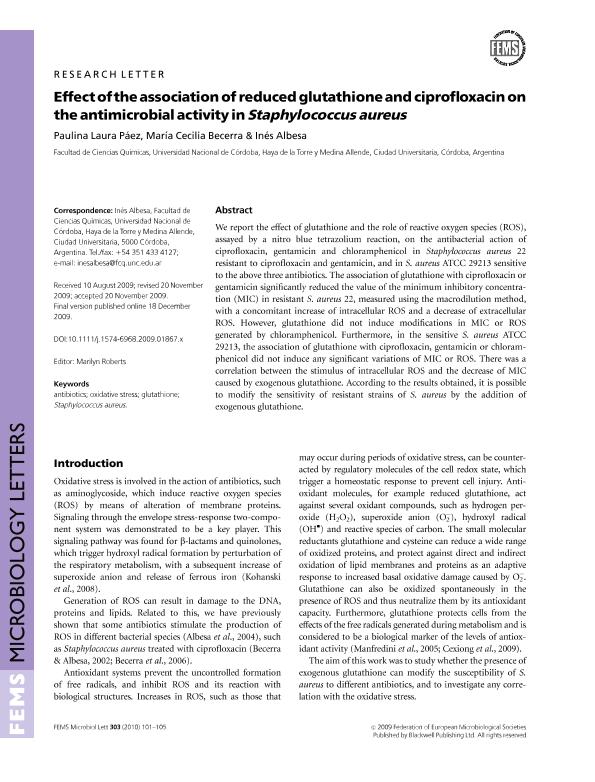Mostrar el registro sencillo del ítem
dc.contributor.author
Páez, Paulina Laura

dc.contributor.author
Becerra, María Cecilia

dc.contributor.author
Albesa, Inés

dc.date.available
2017-09-20T18:27:24Z
dc.date.issued
2010-02
dc.identifier.citation
Páez, Paulina Laura; Becerra, María Cecilia; Albesa, Inés; Effect of the association of reduced glutathione and ciprofloxacin on the antimicrobial activity in Staphylococcus aureus; Oxford University Press; FEMS Microbiology Letters; 303; 1; 2-2010; 101-105
dc.identifier.issn
0378-1097
dc.identifier.uri
http://hdl.handle.net/11336/24711
dc.description.abstract
We report the effect of glutathione and the role of reactive oxygen species (ROS), assayed by a nitro blue tetrazolium reaction, on the antibacterial action of ciprofloxacin, gentamicin and chloramphenicol in Staphylococcus aureus 22 resistant to ciprofloxacin and gentamicin, and in S. aureus ATCC 29213 sensitive to the above three antibiotics. The association of glutathione with ciprofloxacin or gentamicin significantly reduced the value of the minimum inhibitory concentration (MIC) in resistant S. aureus 22, measured using the macrodilution method, with a concomitant increase of intracellular ROS and a decrease of extracellular ROS. However, glutathione did not induce modifications in MIC or ROS generated by chloramphenicol. Furthermore, in the sensitive S. aureus ATCC 29213, the association of glutathione with ciprofloxacin, gentamicin or chloramphenicol did not induce any significant variations of MIC or ROS. There was a correlation between the stimulus of intracellular ROS and the decrease of MIC caused by exogenous glutathione. According to the results obtained, it is possible to modify the sensitivity of resistant strains of S. aureus by the addition of exogenous glutathione.
dc.format
application/pdf
dc.language.iso
eng
dc.publisher
Oxford University Press

dc.rights
info:eu-repo/semantics/openAccess
dc.rights.uri
https://creativecommons.org/licenses/by-nc-sa/2.5/ar/
dc.subject
Antibiotics
dc.subject
Oxidative Stress
dc.subject
Glutathione
dc.subject
Staphylococcus Aureus
dc.subject.classification
Bioquímica y Biología Molecular

dc.subject.classification
Ciencias Biológicas

dc.subject.classification
CIENCIAS NATURALES Y EXACTAS

dc.title
Effect of the association of reduced glutathione and ciprofloxacin on the antimicrobial activity in Staphylococcus aureus
dc.type
info:eu-repo/semantics/article
dc.type
info:ar-repo/semantics/artículo
dc.type
info:eu-repo/semantics/publishedVersion
dc.date.updated
2017-09-15T20:07:52Z
dc.identifier.eissn
1574-6968
dc.journal.volume
303
dc.journal.number
1
dc.journal.pagination
101-105
dc.journal.pais
Reino Unido

dc.journal.ciudad
Oxford
dc.description.fil
Fil: Páez, Paulina Laura. Universidad Nacional de Cordoba. Facultad de Ciencias Quimicas; Argentina. Consejo Nacional de Investigaciones Científicas y Técnicas; Argentina
dc.description.fil
Fil: Becerra, María Cecilia. Universidad Nacional de Cordoba. Facultad de Ciencias Quimicas; Argentina. Consejo Nacional de Investigaciones Científicas y Técnicas; Argentina
dc.description.fil
Fil: Albesa, Inés. Universidad Nacional de Cordoba. Facultad de Ciencias Quimicas; Argentina. Consejo Nacional de Investigaciones Científicas y Técnicas; Argentina
dc.journal.title
FEMS Microbiology Letters

dc.relation.alternativeid
info:eu-repo/semantics/altIdentifier/doi/http://dx.doi.org/10.1111/j.1574-6968.2009.01867.x
dc.relation.alternativeid
info:eu-repo/semantics/altIdentifier/url/https://academic.oup.com/femsle/article-lookup/doi/10.1111/j.1574-6968.2009.01867.x
Archivos asociados
